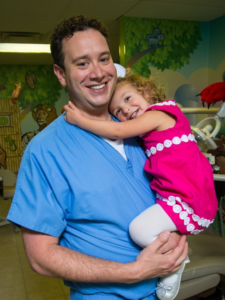Root canal therapy is needed when the nerve of a tooth is affected by decay or infection. In order to save the tooth, the pulp (the living tissue inside the tooth), nerves, bacteria, and any decay are removed and the resulting space is filled with special, medicated, dental materials, which restore the tooth to its full function.
Having a root canal done on a tooth is the restorative dentistry treatment of choice to save a tooth that otherwise would die and have to be removed. Many patients believe that removing a tooth that has problems is the solution, but what is not realized is that extracting (pulling) a tooth will ultimately be more costly and cause significant problems for adjacent teeth.
Root canal treatment is highly successful and usually lasts a lifetime, although on occasion, a tooth will have to be retreated due to new infections.
Signs and symptoms for possible root canal therapy:
-
- An abscess (or pimple) on the gums.
-
- Sensitivity to hot and cold.
-
- Severe toothache pain.
-
- Sometimes no symptoms are present.
-
- Swelling and/or tenderness.
Reasons for root canal therapy:
-
- Decay has reached the tooth pulp (the living tissue inside the tooth).
-
- Infection or abscess have developed inside the tooth or at the root tip.
-
- Injury or trauma to the tooth.
What does root canal therapy involve?
A root canal procedure requires one or more appointments and can be performed by a dentist or endodontist (a root canal specialist).
While the tooth is numb, a rubber dam (a sheet of rubber) will be placed around the tooth to keep it dry and free of saliva. An access opening is made on top of the tooth and a series of root canal files are placed into the opening, one at a time, removing the pulp, nerve tissue, and bacteria. If tooth decay is present, it will also be removed with special dental instruments.
Once the tooth is thoroughly cleaned, it will be sealed with either a permanent filling or, if additional appointments are needed, a temporary filling will be placed.
At the next appointment, usually a week later, the roots and the inside cavity of the tooth will be filled and sealed with special dental materials. A filling will be placed to cover the opening on top of the tooth. In addition, all teeth that have root canal treatment should have a crown (cap) placed. This will protect the tooth and prevent it from breaking, and restore it to its full function.
After treatment, your tooth may still be sensitive, but this will subside as the inflammation diminishes and the tooth has healed.
You will be given care instructions after each appointment. Good oral hygiene practices and regular dental visits will aid in the life of your root canal treatment.
Accepting new patients! Dr. Singer combines 20+ years of expertise with a judgment-free, understanding approach that puts both kids and parents at ease.

Frequently Asked Questions About Pediatric Root Canals
Why would my child need a root canal instead of just extracting the tooth?
While extraction might seem like a simpler solution, preserving your child’s natural tooth through root canal therapy offers significant benefits. Baby teeth serve as important placeholders for permanent teeth, and losing them prematurely can lead to spacing issues, misalignment of permanent teeth, and potentially more extensive orthodontic treatment later. At ABC Children’s Dentistry, Dr. Singer carefully evaluates each situation to determine the best approach. Root canal therapy allows us to save an infected or severely decayed tooth while eliminating pain, preventing infection from spreading, and maintaining proper spacing for permanent teeth. Our goal is always to make treatment decisions that support your child’s long-term dental health and development.
How will I know if my child needs a root canal?
Is a root canal painful for children?
At ABC Children’s Dentistry, we understand parents’ concerns about their child experiencing pain. Dr. Singer takes great care to ensure your child remains comfortable throughout the entire root canal procedure. The tooth and surrounding area are thoroughly numbed before treatment begins, so your child shouldn’t feel pain during the procedure. Many children report that getting a root canal feels similar to having a regular filling. After treatment, some mild discomfort or sensitivity may occur as the inflammation subsides, but this typically resolves quickly. We provide clear instructions for managing any post-treatment discomfort, and Dr. Singer is always available to address concerns. Many parents are surprised by how well their children tolerate the procedure and how quickly they return to normal activities.
How do I care for my child's tooth after root canal therapy?
After your child’s root canal therapy, proper care is essential for healing and long-term success. For the first few days, your child should avoid chewing on the treated tooth until any discomfort subsides. Soft foods are recommended initially. Regular brushing and flossing should continue, being gentle around the treated area. If a temporary crown was placed, avoid sticky or hard foods that could dislodge it until the permanent restoration is complete. Any mild discomfort can typically be managed with children’s over-the-counter pain relievers as directed. It’s important to keep all follow-up appointments to ensure proper healing and to complete any remaining treatment steps. If you notice any unusual symptoms like increasing pain, swelling, or if a temporary crown comes off, contact our office right away. With proper care, a tooth that has had root canal therapy can last throughout childhood until it’s naturally replaced by a permanent tooth.


